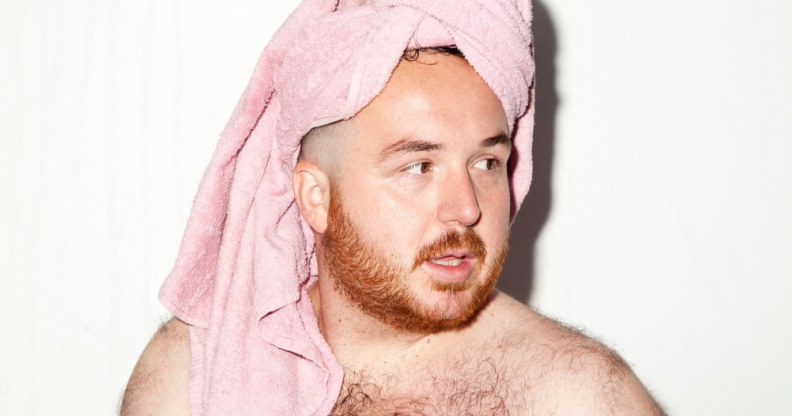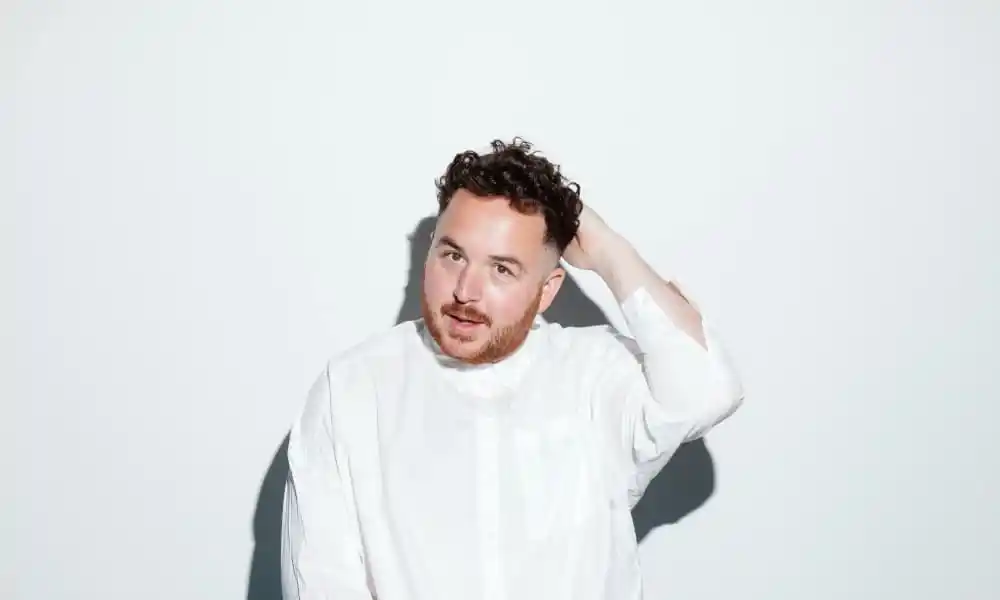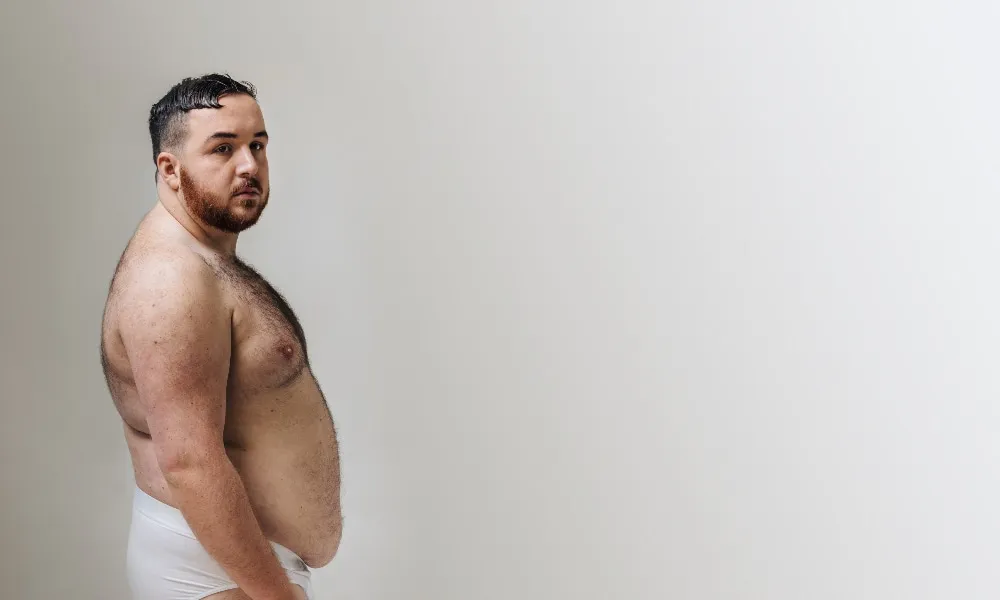No, I don’t deserve to be violently attacked in a queer space just because I’m fat

Performer Scottee. (Supplied)
The joke that day was almost always the same.
On 22 February, prime minister Boris Johnson of Britain announced his fabled blueprint for easing lockdown – with a 21 June date stamped as the earliest when all restrictions would be rowed back.
So countless queer men did what they do best: Tweet. Joking about how they have only months to “get into shape”, “get thin”, “get skinny”, “get hot”, “lose weight”, “lose those lockdown pounds” and, above all, “no longer be fat”.
Scottee, an award-winning London-based artist, was not impressed. Neither was he surprised. He’s used to it. He expects it. And he’s frankly had enough of it.
“Being fat is not the worst thing that you could possibly be like,” Scottee told PinkNews. “The worst thing you could possibly be is a gay Tory.”
When Scottee speaks about his activism and art, about being fat and about being queer, he twists and tugs on his words almost as if they were balloon art. He could easily inflate each and every word one-handed as if he’s done it a thousand times before.
Which he certainly has done – Scottee is often forced to justify and defend his own existence as a queer fat person.
After all, it’s not just from gay men that the playwright encounters fatphobia. Thursday (4 March) is World Obesity Day, run by the World Obesity Federation, a non-profit with ties to the World Health Organisation.
The day’s aim, it states on its website, is to “lead and drive global efforts to reduce, prevent and treat obesity”. A campaign that Scottee is now setting a “counter-protest” against.
“Their main messaging is essentially that fat people are stupid and are a threat to the global economy,” he bluntly said. “They make a lot of noise with pro-diet, anti-fat rhetoric.
https://twitter.com/ScotteeIsFat/status/1367388177498058752
“And as somebody who doesn’t feel like they need to be cured, and is somebody who doesn’t feel like they are like out there trying to desperately ask the world how it can change me, I just wanted to demonstrate that there is another experience.
“There are people who, funnily enough, don’t want to be changed and are in love with themselves and like the sound of their own voices.
“So because I’m an un-educated anti-capitalist, I felt I should definitely retort them.”
Scottee, who helms a kaleidoscopic collective of artists, producers and other content-makers known as Scottee & Friends, is probably taking his shirt off as you read this. He, alongside 30 of his friends, are leading a 10-hour-long performance line-up in response to World Obesity Day under the hashtag #WorldObesityDayHACK.
There will be a beauty pageant for fat folk called “Hamburger Queen“, a cabaret show and a Zoom quiz featuring talents such as Asad Ullah, Fatt Butcher, Gina Tonic, Katie Greenal and Toni Lewis, among many more events and performers throughout the day.

(Supplied)
But Scottee hasn’t always been warring against World Obesity Day. He was, a certain amount of years ago that he doesn’t quite like to admit, a young queer guy in an Adidas tracksuit ready to live the life that Russell T Davies programmes promised him.
“Queer as Folk missold me the idea that I will suddenly walk down Canal Street in Manchester and everybody will fall in love with me – a very different experience to what I had on the London clubs where I was largely ridiculed and abused for being a big fat Mary.”
The complexities and nuances of people’s lives can be difficult to cleanly cram into a single word. For Scottee, he has no trouble doing just that for the queer fat experience: “It’s uncomfortable.”
There is, of course, more to being fat and queer, Scottee stressed. It’s also about companionship. “It wasn’t until I found other fat queers and other fat weirdos that I realised this was a shared experience that we were shamed in nightclubs and bars because of our bodies.
“I guess part of me making this work is about finding my gang, finding the fat weirdos that are also feeling a bit like pushed out and shoved out, and claiming some form of space for us.”
Indeed, there might be spaces for queer folk who “are on Nintendo Switch chasing Pokémon,” he joked, chuckling, “but that’s not me, unfortunately.”
Scottee: The government fuelled ‘fear that as a fat person, I will die of coronavirus’
When people thumb through the tiled torsos of Grindr, watch a rerun of Will & Grace, or scroll through Instagram thirst traps, they’re usually greeted with a static smile by the same thing: Body-shaming.
Jokes about being “gay fat, straight thin” and men hanging signs outside their dating profiles that say: “No fats, no femmes.” Men, queer guys especially, feel a certain type of pressure to be a pair of walking biceps with a washboard stomach.
Not surprising, researchers say. Dalhousie University found that the “social demands placed upon gay men to eat healthily and achieve a perfect body are linked to anxiety and depression and have serious mental health consequences”.
This demand to look like a man Ryan Murphy would hire as his six-foot cardboard cutout lead is what the National Eating Disorder Association says is one of the “unique stressors” that “may contribute to the development of an eating disorder” among LGBT+ people.
“If we take a real deep dive into gay men and their relationship with their bodies, I think there is so much shame and post-traumatic stress attached to queerness,” Scottee said. “This sense that you are as good and as successful as you look.
“There is research that shows that a lot of gay men’s associations with their body and fixation on how they look can take us all the way back to the AIDS epidemic in the 80s. To have muscle – to have weight – was to look healthy and to have not had the virus.
“I think we’re still living with some of those legacies. As a community, we have to take responsibility that we have actively endorsed that culture.”

Scottee. (MJ Chapman)
The coronavirus pandemic, Scottee said, has only provoked these painful pressures. Especially as the government “still managed to carve out time, space and 10 million pounds to create a campaign that essentially said, if you’re fat and die of COVID-19, it’s your own fault, which is complete scapegoating”.
The campaign by the nation’s top healthcare agency, Public Health England, treated the pandemic as if it were the “survival of the fittest”, Scottee said, fuelling “this sense of fear that as a fat person, I will die”.
“Current evidence does not suggest that having excess weight increases people’s chances of contracting COVID-19,” a statement about the campaign reads. “However, data shows that obese people are significantly more likely to become seriously ill and be admitted to intensive care with COVID-19 compared to those with a healthy [body mass index].”
Soon enough, Scottee found himself in front of folks who gained “lockdown weight” complaining about it to him. “Oh God, I’m, so fat,” they’d tell him before “realising who they’re talking to.”
“People have had to do a lot of self-care in terms of identifying the fact that they are broken,” Scottee said, reflecting on the past year. “We’ve been really tested throughout lockdown about how we feel about ourselves.
“The take-home message here isn’t that I’m saying you shouldn’t be a muscle queen, or that you shouldn’t be. What I’m saying is: Do I deserve to be violently attacked in a gay space because I’m fat? Do my friends deserve to have to be glassed in Soho because they’re fat?
“I’m not saying you have to be fat. I’m saying: ‘Do you have to penalise me and make other fat queer people’s lives difficult because we’re not like you?'”

